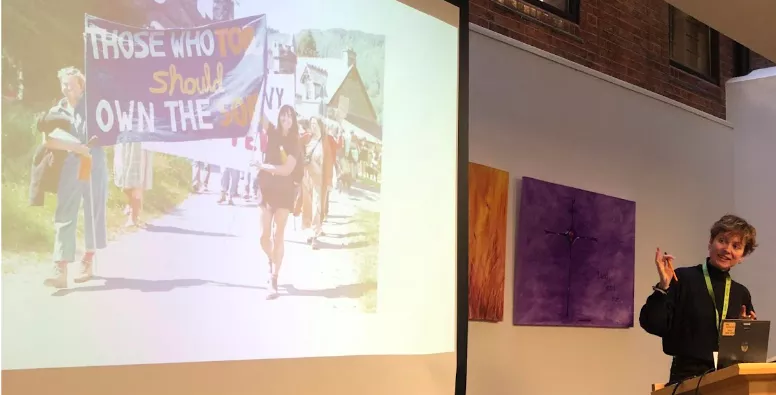
Author: Jessica Victoria Chapman
UK land ownership in crisis
The UK’s land ownership patterns are a stark reminder of deep rooted historical inequalities. Josh Doble, policy manager for Community Land Scotland stated that 50% of Scotland’s rural land is controlled by corporations, historic estates, and international investors, leaving just 3% in community hands. In England and Wales, land ownership remains concentrated in the hands of a wealthy few, with opportunistic investors and corporations increasingly controlling land prices and land grabbing for natural capital profit ventures rather than offering up land for community-based regenerative agriculture. This consolidation erodes the potential for small-scale, regenerative farming and entrenches barriers for new farm entrants.
ORFC’s recent session on Land Reform and Accessing Land for Agriculture featured activist and researcher Tara Wight and Josh Doble who dissected the question: how can we get land into the hands of farmers? From the unique tenure system of Scottish crofting to the emerging 2025 campaigns for a Community Right to Buy in England, the workshop illuminated examples and mechanisms to democratise land ownership. Yet, the urgency of this issue demands broader concerted action to ensure that land reform does not remain a niche concern or merely a public body asset transfer that perpetuates concentrated and privatised ownership models, but a shift to prioritising more cooperative ownership.
Lessons from Scottish crofting and English community land models
The Scottish Highlands and Islands offer an example of a historical precedent for land reform given a tradition of land resistance to preserve Gaelic cultural ties to farming. Crofting—a legacy of the Highland Clearances, ensures secure, heritable, and low-rent access to land. Crofting arrangements, however, are not without challenges as land demand outstrips land supply, landlords lack incentives to create new crofts and court decisions often favor landowners in disputes.
In England, there is growing momentum for increased community land ownership supported by democratic governance. The English Devolution Bill introduces a Community Right to Buy, marking a promising step toward empowering local communities with decision-making authority over public assets, however, England’s political will for land reform remains fragile. Promising pilot projects like the South West Land Match scheme in England aim to connect landholders with growers, seeking to provide a centralised service that facilitates mutually beneficial agreements between both parties.
The path to systemic change lies in grassroots mobilisation
The session underscored three key calls to action:
- Support Legislative Change: Campaign for policies and legislation that prioritize community rights over privatised ownership. Scotland’s reforms, while imperfect, demonstrate the potential for legislative frameworks to empower local communities. England must follow suit, enacting its Community Right to Buy and expanding land-matching schemes nationwide.
- Champion Cooperative Models: Move beyond landlord-tenant relationships to models where farmers share ownership and governance. Community Benefit Societies (CBS) mentioned by Oli Rodker from the Ecological Land Coop offer a blueprint, pooling resources to purchase land and granting farmers decision-making power.
- Push for Tax and Policy Reform: Land reform must address power imbalances at their root. Tax incentives should discourage speculative investments and promote cooperative agricultural uses. Policies must also facilitate financing for new entrants, particularly those from non-farming backgrounds.
An ecosystem of collective efforts
Land is not just an asset; it’s a foundation for food sovereignty, environmental resilience, and community well-being. From Scotland’s crofting traditions to existing cooperatives and ownership initiatives in England and Wales, what is direly needed now is to challenge entrenched systems by collaborating across sectors to put land access and ownership back into the hands of those who responsibly steward it.
About the Author:
Jess Chapman is an interdisciplinary soil researcher at The University of East Anglia/Tyndall Centre for Climate Change Research focussing on soil carbon as part of the regenerative agriculture movement. She works at the interface of UK agri-environment policy, social science and soil science. Her work also involves creative/arts-based approaches for educational soil science outreach/communications (theatre, film, audio, prose, poetry).
Contact details: Jessica.Chapman@uea.ac.uk
The Conversation 2025 publication – Regeneratively farmed is the new buzz label on supermarket shelves – but what does it actually mean?

